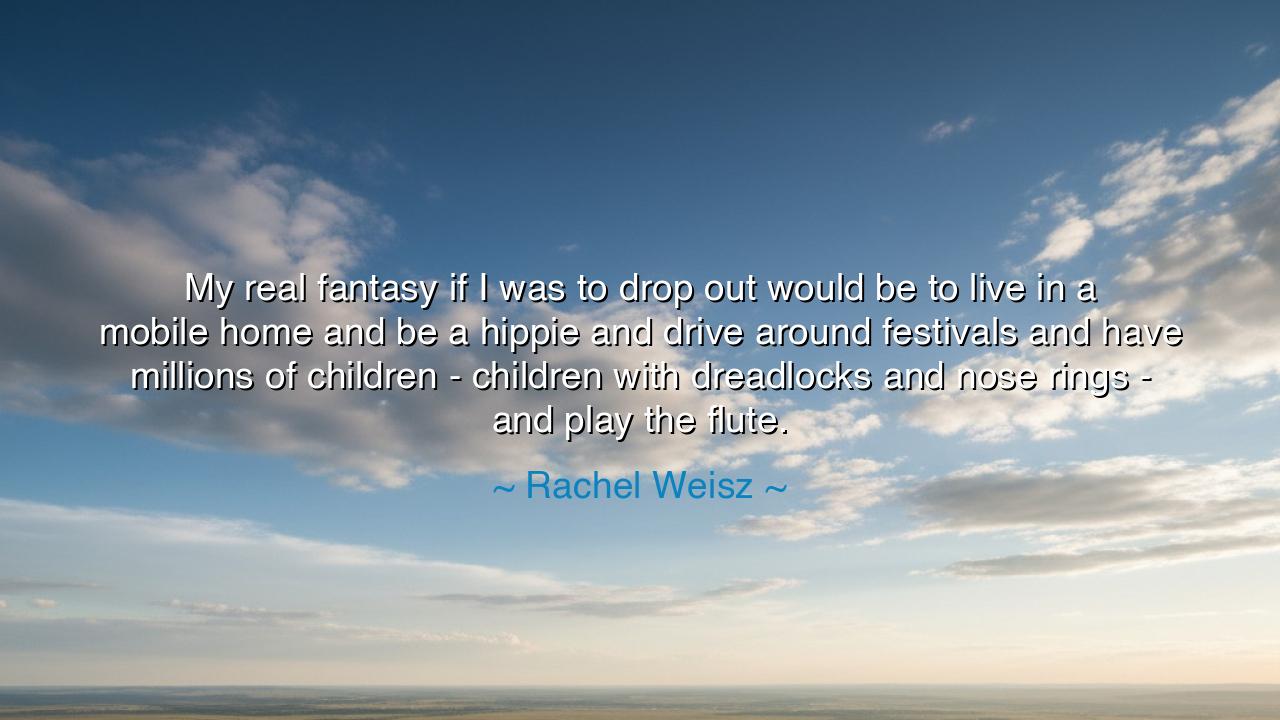
My real fantasy if I was to drop out would be to live in a mobile
My real fantasy if I was to drop out would be to live in a mobile home and be a hippie and drive around festivals and have millions of children - children with dreadlocks and nose rings - and play the flute.






In the voice of Rachel Weisz, there echoes a yearning ancient as humanity itself: “My real fantasy if I was to drop out would be to live in a mobile home and be a hippie, and drive around festivals and have millions of children—children with dreadlocks and nose rings—and play the flute.” To the unseeing, these words may seem light or whimsical—a dream of freedom spoken by an artist’s heart. But to those who listen deeply, they are a whisper from the soul’s forgotten garden, a longing for a life unchained from the iron clocks and endless noise of the modern world.
There is in her vision the eternal human desire for simplicity, for a return to the earth, to wander as our ancestors once did—unburdened, untamed, alive in the pulse of creation. The mobile home becomes not merely a vehicle, but a symbol of freedom, a chariot of the spirit that carries one beyond the walls of conformity. To be a hippie, in this ancient sense, is not to rebel against society for rebellion’s sake, but to reclaim the right to breathe, to dream, to belong not to possessions but to life itself.
The image of children with dreadlocks and nose rings, joyous and unashamed, speaks to a world ungoverned by fear or judgment—a realm where each soul wears its truth openly. It is the dream of a generation that remembers what civilization often forgets: that beauty lies not in order, but in authenticity; not in obedience, but in expression. The flute, too, is no idle fancy—it is the song of the wanderer, the music of one who moves with the wind, who finds rhythm in rivers and harmony in the laughter of strangers.
Think of Diogenes of Sinope, the ancient philosopher who rejected the luxuries of Athens and chose to live in a barrel. When Alexander the Great asked if he could grant him anything, Diogenes replied, “Stand out of my sunlight.” For he, like Weisz, sought freedom—not in possessions, but in the ability to live as his spirit desired. His barrel was her mobile home; his sunlight, her music. Both were dreamers who saw through the illusions of wealth and status, and sought instead the riches of simplicity and self-truth.
Yet there is something bittersweet in Weisz’s words, for it is a fantasy, not a reality. She speaks as one caught between two worlds—the world of art and acclaim, and the world of earth and wind and wandering song. Her confession reveals the cost of success: the more the world crowns you, the heavier its crown becomes. Her fantasy of dropping out is the ancient call to return—to find again the innocence that fame, responsibility, and ambition slowly erode.
But let us not mistake her vision for mere escapism. Beneath its playfulness lies a teaching: that the spirit must not be imprisoned by circumstance. Even in the cities, even in the towers of glass, one can still live freely if the heart remains open, if one dances sometimes, listens to music, and nurtures the wild, childlike soul within. The mobile home, the flute, the festivals—all are symbols of a greater truth: that happiness cannot be owned, it must be lived.
So hear this, O seeker of peace: do not let the world harden you. Let your life be a festival of small joys. Let your children—whether of body or of imagination—grow with wonder and wildness. Make your days a kind of music, and your home wherever your spirit feels most alive. For in this lies the wisdom of both sage and artist—to walk lightly upon the earth, to love deeply, and to live truthfully, even when the world demands masks.
In the end, Rachel Weisz’s fantasy is a mirror for all who dream of escape, not from life, but toward it. The lesson is clear: live simply, love freely, create boldly. Whether you dwell in a palace or a van by the sea, play your flute—for the music of the soul is the only song that never fades.






AAdministratorAdministrator
Welcome, honored guests. Please leave a comment, we will respond soon